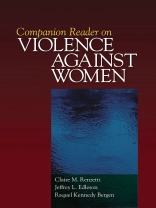An invaluable companion to the Sourcebook on Violence Against Women, Second Edition
Designed to advance knowledge about violence against women and to serve as an inspiration to those studying or working in the field, this companion reader′s 20 original articles focus first on theoretical and methodological issues, then on types of violence against women, and finally on prevention and direct intervention. Readers will find a wide range of articles that draw attention to the global dimensions of violence against women and the importance of taking into account political, economic, and cultural differences across diverse groups of people. While the book′s articles are designed as companion pieces to the chapters in the Second Edition of the Sourcebook, this reader may also be used as a stand-alone text by those researching specific topics, such as diversity issues, conducting trainings, or teaching advanced courses, such as international social work.
Table des matières
Introduction
Part I: Theoretical and Methodological Issues in Researching Violence Against Women
An ecological model of the impact of sexual assault on women’s mental health. Trauma, Violence, & Abuse, 10, 225-246. (2009) – R. Campbell, E. Dworkin, G. Cabral
The capabilities approach and violence against women: Implications for social development. International Social Work, 51, 25-36. (2008) – L. Pyles
Collecting reliable information about violence against women safely in household interviews: Experience from a large-scale national survey in South Asia. Violence Against Women, 15, 482-496. (2009) – N. Anderson, A. Cockcroft, N. Ansari, K. Omer, U. U. Chaudhry, A. Khan, L. Pearson
Development of the Scale of Economic Abuse. Violence Against Women, 14, 563-588. (2008) – A. E. Adams, C. M. Sullivan, D. Bybee, M. R. Greeson
Part II: Types of Violence Against Women
The extensive sexual violation and sexual abuse histories of incarcerated women. Violence Against Women, 14, 1090-1127. (2008) – C. Mc-Daniels-Wilson, J. Belknap
Gendered war and gendered peace: Truth commissions and post-conflict gender violence: Lessons from South Africa. Violence Against Women, 15 , 1169-1193. (2009) – T. A. Borer
(2010). Violence against women and natural disasters: Findings from post-tsunami Sri Lanka. Violence Against Women, 16. (2010) – S. Fisher
Understanding human trafficking in the United States. Trauma, Violence, & Abuse, 10, 3-30. (2009) – T. K. Logan, R. Walker, G. Hunt
“You just give them what they want and pray they don’t kill you”: Street-level sex workers’ reports of victimization, personal resources, and coping strategies. Violence Against Women, 9, 1367-1394. (2003) – R. L. Dalla, Y. Xia, H. Kennedy
Attitudes toward wife beating: A cross-country study in Asia. Journal of Interpersonal Violence, 24, 1371-1397. (2009) – M. Rani, S. Bonu
Intersections of immigration and domestic violence: Voices of battered immigrant women. Feminist Criminology, 4, 32-56. (2009) – E. Erez, M. Adelman, C. Gregory
Invisible or pathologized? Racial statistics and violence against women of color. Critical Sociology, 34, 193-211. (2008) – K. Ferraro
When crises collide: How intimate partner violence and poverty intersect to shape women’s mental health and coping. Trauma, Violence, & Abuse, 10, 306-329. (2009) – L. A. Goodman, K. F. Smyth, A. M. Borges, R. Singer
Adult domestic violence in cases of international parental abduction. Violence Against Women, 11, 115-138. (2005) – S. Shetty, J. L. Edleson
Domestic violence between same-gender partners: Recent findings and future research. Journal of Interpersonal Violence, 20, 149-154. (2005) – J. C. Mc Clennon
Part III: Prevention and Direct Intervention
Sexual assault support services and community systems: Understanding critical issues and needs in the LGBTQ community. Violence Against Women, 15, 952-976. (2009) – J. L. Todahl, D. Linville, A. Bustin, J. Wheeler, J. Gau
Normative misperceptions of abuse among perpetrators of IPV. Violence Against Women, 16, 370-386. (2010) – C. Neighbors, D. D. Walker, L. F. Mbilinyi, A. O’Rourke, J. L. Edleson, J. Zegree, R.A. Roffman
Danger zone: Battered mothers and their families in supervised visitation. Violence Against Women, 14, 1313-1325. (2008) – T. Parker, K. Rogers, M. Collins, J. L. Edleson
Factors associated with engagement in a police-advocacy home-visit intervention to prevent domestic violence. Violence Against Women, 14, 1430-1450. (2008) – C. S. Stover, A. M. Rainey, M. Berkman, S. Marans
Partnering with community-based organizations to reduce intimate partner violence. Hispanic Journal of Behavioral Sciences, 31, 224-257. (2009) – T. Bloom, J. Wagman, R. Hernandez, N. Yrogui, N. Hernandez-Valdovinos, M. Dahlstrom, N. Glass
The violence against women campaigns in Latin America. Feminist Criminology, 3, 145-168. (2008) – S. Cole, L. Phillips
A propos de l’auteur
Raquel Kennedy Bergen is a Professor of Sociology at Saint Joseph’s University in Philadelphia, Pennsylvania. She received her BS from Saint Joseph’s University in Sociology and her Ph.D. in Sociology from the University of Pennsylvania. She is the author or co-author of numerous scholarly publications and nine books on violence against women including, Wife Rape: Understanding the Response of Survivors and Service Providers; and Issues in Intimate Violence. With Claire Renzetti and Jeff Edleson she edited, Sourcebook on Violence Against Women and Violence Against Women: Classic Statements. She co-edited Violence Against Women: Readings from Social Problems with Claire Renzetti. She is the current Chair of Gender Studies at Saint Joseph’s and the faculty moderator for the Rape Education Prevention Program. Her area of expertise is sexual violence in intimate partnerships and she regularly provides workshops around the country to domestic violence and rape crisis programs to address this form of violence. She has volunteered as an advocate for battered women and sexual assault survivors for the past 27 years. Her current research continues in the field of violence against women—analyzing the intersection of women’s experiences of physical, sexual and emotional violence with their partners during pregnancy.












